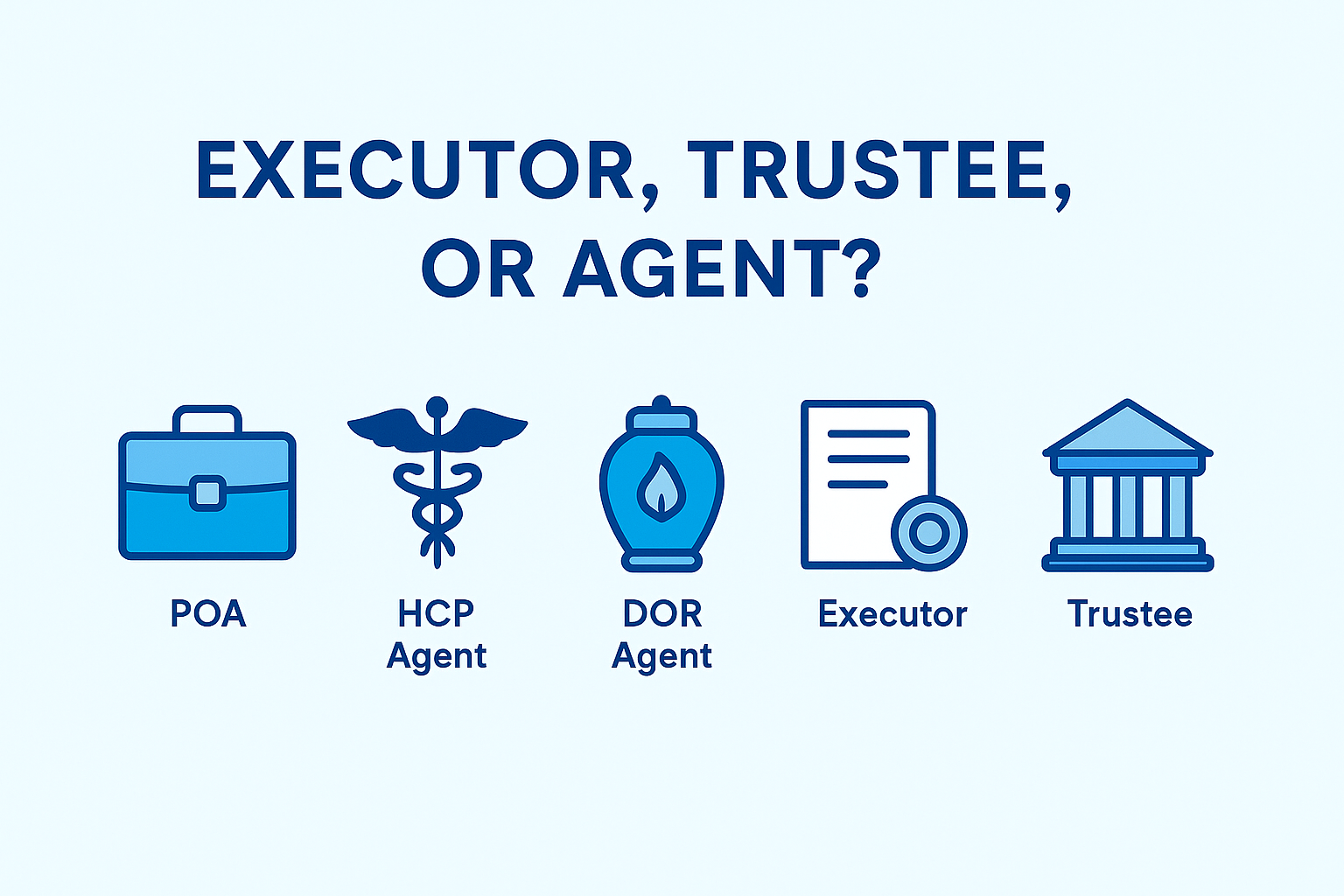Agents, Executors, Trustees — Explained Simply
When planning your estate, one of the most important choices you’ll make is who to appoint in key fiduciary roles. These people will make financial, medical, legal, and end-of-life decisions for you and your family — so it’s essential to understand what each position involves.
Agent on a Power of Attorney (POA)
- Obligations: Step into your shoes in all FINANCIAL decision making. This includes paying your ongoing bills and financial obligations, communicating with lawyers, accountants, banks, IRS, Medicaid, etc. The agent must act in your best interests and keep good records.
- Risks: Can be sued for blatant misuse of funds; can be sued if $ is transferred to the agent themselves without prior explicit permission from the Principal.
- Duration: the agent starts acting after you become incapacitated and his duties continue until the moment of death.
- Compensation: Typically “reasonable compensation” (often waived by family).
- Choosing an Agent: Pick someone trustworthy, organized, and financially responsible.
Agent on a Health Care Proxy (HCP)
- Obligations: Follow your stated MEDICAL wishes and values; consult doctors; consent or refuse treatment.
- Risks: Emotional stress, possible family pressure; liability is generally limited when acting in good faith.
- Duration: the agent starts acting after you become incapacitated and his duties continue until the moment of death.
- Compensation: Generally unpaid.
- Choosing an Agent: Select someone who understands your personal beliefs and can make tough calls under pressure.
Agent for Disposition of Remains (DOR)
- Obligations: Arrange funeral services, select burial/cremation, follow your instructions (e.g., religious practices, ceremony details).
- Risks: May face family disagreements; having clear written wishes greatly reduces conflict.
- Compensation: Typically unpaid; reasonable expenses are paid from your estate.
- Choosing a DOR Agent: Choose someone reliable, reachable quickly, and committed to honoring your specific preferences.
Executor of a Will
- Obligations: File the probate petition and the Will with the court, once appointed as Executor by a valid decree – collect all assets remaining in your name, pay debts/taxes, handle ongoing court filings including accounting, and distribute property to beneficiaries.
- Risks: Personal liability for mishandling assets, or for blatant transfers to himself without court approval, missing deadlines, or ignoring court rules.
- Compensation: Entitled to NY statutory commissions (based on the size of the Estate).
- Duration: The Executor starts acting after death, Limited usually to 1-2 years, while the Estate is open
- Choosing an Executor: Pick someone detail-oriented, financially savvy, patient, and diplomatic with family dynamics.
Trustee of a Trust
- Obligations: Follow the Trust’s terms, make distributions, keep records, file taxes, communicate with beneficiaries, invest the assets prudently.
- Risks: Liability for self-dealing or ignoring the Trust instructions.
- Compensation: Entitled to NY Statutory commissions (based on the size of the Trust and amount of distributions)
- Duration: May be 10-20-30 years, depending on the Trust terms and age of the beneficiaries.
- Choosing a Trustee: Consider the workload and time horizon; a responsible family member may work, but complex or long-term trusts often benefit from a professional or institutional trustee.
The Bottom Line
Fiduciaries play critical roles in carrying out your wishes. These positions carry real responsibility—and sometimes risk—but with the right people and clear instructions, your plan will work the way you intend. Choosing thoughtfully is just as important as drafting the documents.
At Sverdlov Law, PLLC, we help families understand these roles, document their wishes (including DOR preferences), and appoint fiduciaries who can serve effectively.
Contact Sverdlov Law PLLC today at www.sverdlovlaw.com or 212-709-8112 or book a time on our calendar https://calendly.com/rochelle-sverdlovlaw/15min for a FREE evaluation of your case and get started with a plan tailored to your family’s needs.
This information is provided as a general overview and does not constitute legal advice. For personalized guidance, consult a New York special needs attorney.


